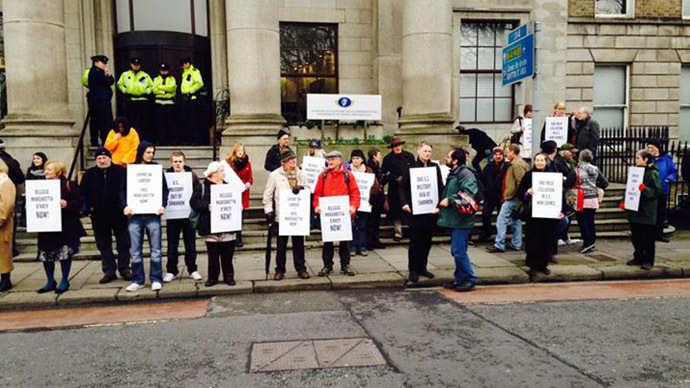Protests continue over use of Shannon Airport in Ireland

When most people think about rendition or the Second Iraq War, they tend to focus on aggression and human rights abuses perpetrated by the United States or United Kingdom. But what about those lesser-known States who acted as their facilitators?
It’s a little-known fact that one of the most accommodating nations vis-à-vis rendition and the Second Iraq War is none other than the Republic of Ireland, which has allowed over a million US troops to pass through Shannon Airport (located on Ireland’s scenic west coast) on their way to war in Iraq. Similarly, the Irish government has refused to investigate so-called rendition flights landing at Shannon. These flights are conducted by intelligence agencies, often operating under the guise of a civilian shell company, and deliver kidnapped terror suspects to black sites in developing countries where they are – in an appalling re-run of Spanish Inquisition tactics – routinely tortured and mistreated in an attempt to obtain confessions and other information.
Horrifying as this wanton circumvention of the rule of law is under any circumstances, it is even more chilling to realize that innocent people have been subjected to rendition for no better reason than that they were unfortunate enough to have a name similar to someone who was on a suspect list, or because they spoke to someone who spoke to someone who was on a suspect list.
And none other than Shannon Airport was explicitly named by the Venice Commission – a highly respected body of independent legal experts which advises the Council of Europe and its members – as a point of unlawful inter-State transfer in relation to rendition flights in its 2006 report on the subject.
Apparently disregarding this report, not to mention internal pressure, various Irish governments have consistently relied on a position of willful ignorance in regards to the near certainty that up to fifty rendition flights have been routed through Ireland.
In 2004, the Minister for Foreign Affairs limply stated that, “The government has no information to indicate that prisoners are being transported through Irish airports to and from Guantanamo or elsewhere. Furthermore, the US authorities have confirmed to our Embassy in Washington that they have not been using Irish airports for this purpose…” All this while one of the infamous Wikileaks embassy cables revealed that plans to establish a parliamentary committee on the issue was “clearly a sop to a beleaguered Green Party and expectations are low that it will actively engage US interlocutors.”
So with Ireland’s leaders more than accommodating on this point, why has the use of Shannon Airport remained a live issue for over a decade? Is it merely another example of the legendary Irish tenacity in not giving up a fight?
While a culture of long-haul resistance might well play a role, the key here is really Ireland’s long-standing and deeply-rooted policy of military neutrality. Ireland is not a NATO member and unlike other Western European nations, spent much of its history on the short end of the colonial stick. As a result, many Irish can sympathize with other post-colonial nations, have a rather relaxed view of armed resistance to occupation (the Palestinian cause, for example, enjoys mainstream support) and possess a healthy skepticism of foreign military interventions. In addition, Irish people have genuinely enjoyed cruising around the world on the back a revolutionary aura that declares whatever you may have done to stick it to the establishment, we did it first and we did it better.
That scrupulous neutrality (not to mention the carefully cultivated rebel image) has been tarnished, because Ireland has aided in facilitating an illegal war of aggression contrary to some of our most cherished beliefs about what it means to be Irish; it is rather difficult to pass oneself off as neutral once the core provisions under international law that govern neutrality have been very obviously broken.
And Ireland has broken these rules in a most unequivocal manner. According to Article 2 of The Hague Convention V Respecting the Rights and Duties of Neutral Powers and Persons in Case of War on Land, a party to a war is not allowed to move troops or munitions across the territory of a neutral nation. Moreover, Article 11 of the same convention stipulates that a neutral country that “receives on its territory troops belonging to the belligerent armies” must intern them at a safe distance from the theater of war. In other words, any country that would like to call itself neutral is obliged to prevent warring parties from moving troops through its territory and to gently scoop up anyone attempting to contravene this principle and keep them away from whatever war they were trying to get to.

These are solid and time-tested rules that have been in place for
over a century, and Ireland’s attempts to sidestep them by
proclaiming that it only exercises “qualified
neutrality” (which apparently means that it is neutral when
it feels like being neutral) aren’t achieving much beyond letting
everyone know that when it comes to willfully misinterpreting
international law, Ireland should really be taking a few lessons
from the US, which at least misinterprets international law with
a degree of finesse and professionalism that lets you know that
someone cares enough to make an effort.
With all of this difficulty surrounding neutrality and subsequent
degeneration into the nether-realm of “qualified
neutrality,” one might be wondering if it wouldn’t have made
more sense just to bypass Shannon and refuel somewhere people
aren’t so prickly on this point.
Part of it at least is due to the fact that in bygone days Shannon was a popular spot for commercial aircraft to refuel before and after crossing the Atlantic. The airport also has a long history of use for military stopovers in cases where troops are unarmed and they are not being transported to a theater of war. In other words, it has all of the facilities to process a large volume of stopovers and is conveniently located in the middle of nowhere - Out of sight, out of mind, as the saying goes.
Fortunately, Shannon’s awkward location hasn’t prevented concerned Irish citizens from protesting rendition flights and troop transports to Iraq. In 2003, a group of protestors entered the airport and damaged a transport aircraft. Following several mistrials, all of them were acquitted by a jury in 2006, lending credence to pacifist claims that a majority of Irish share their disapproval of the way that Shannon Airport is being used.
Recent protestors, however, have not been so lucky. Case in point: Margaretta D’Arcy. In a bid to keep up the pressure on Shannon – which protestors fear could be used for military action against Syria – 79-year-old D’Arcy breached the perimeter fence and attempted to block the runway.
D’Arcy has a long history of political activism behind her, and after refusing to sign a bond to uphold the law (i.e. to not do that again) she is now entering the second month of a three month sentence in Mountjoy Prison in Dublin. Such politically-channeled vigor in one so advanced in years is a rarity, but what really distinguishes this case is that its central figure already enjoyed a relatively high profile within Ireland. A longtime member of Aosdána, the country’s most prestigious body of artists, D’Arcy is an accomplished playwright and personal friend of President Michael D. Higgins. She is also suffering from cancer and Parkinson’s disease.
None of the above makes for very good press, especially in a nation where many have been quick to make comparisons between D’Arcy’s case and the numerous bankers and financial speculators who have not faced charges despite their dubious activities.
However, I would suggest that this case has hit a nerve with Irish people (solidarity protests continue apace) because it serves as a counterpoint to what has recently become the dominant narrative of mainstream Irish politics.
Indeed, when it comes to all things American, Ireland’s political and business leaders have adopted a position that bears more than a passing resemblance to Stockholm-syndrome. Appalled at the thought of Ireland losing business (a corporate tax haven, Ireland sports branches of many a multinational) or what could happen to the “undocumented Irish” (illegal immigrants) in America, Ireland’s more recent leaders seem to view overzealous and even anticipatory compliance with any American demand as their only viable option.
The idea of incurring a bit of pain and suffering in the interests of upholding the national values (and in the long-run, the national image) is far out of favor. Ms. D’Arcy’s case on the other hand exemplifies the opposite philosophy: namely that where there is a will, there is a way.
The statements, views and opinions expressed in this column are solely those of the author and do not necessarily represent those of RT.
The statements, views and opinions expressed in this column are solely those of the author and do not necessarily represent those of RT.













